There’s a turning-point scene in Francis Ford Coppola’s 1979 Vietnam War film “Apocalypse Now” where Martin Sheen’s character Captain Benjamin L. Willard and his band of American soldiers massacre an innocent Vietnamese family of civilians aboard a sampan his crew has raided. The sound of guns firing and men shouting drowns out the screams of the dying Vietnamese people.
Soon after, Willard kills the lone survivor of the sampan: a Vietnamese woman. Even in death, her facial expression is barely registered on camera. We see her body twist from the impact, but any pain she might’ve felt goes unheard. We find out she has been protecting a puppy before being killed, and we see the soldiers hold and regard the puppy with more gentleness and respect than they had the Vietnamese lives they just slaughtered. The scene rounds out with Willard reflecting via voiceover on his actions with an air of resignation as the men continue upriver. At the same time, presumably, Vietnamese bodies lie in the water all around them. We can’t know for sure because the camera doesn’t show them.
"They're not characters with a story . . . they’re either a prostitute, a peasant or get killed in the mud."
Such scenes where Vietnamese people are portrayed as collateral damage and brutally killed with nary a line uttered on screen are common throughout the American cinematic canon. Vietnamese American actress Kieu Chinh, 86, understands the consequences of these depictions better than anyone. Boasting a 67-year acting career across 65 and counting Asian and U.S. television shows and films, Kieu Chinh has starred in over 20 Hollywood stories about the Vietnam War. These include “A Yank in Viet-Nam” (1964), “Operation C.I.A.” (1965) and “Hamburger Hill” (1987), among others. At one point, she was even nearly cast in “Apocalypse Now.” Most recently, she starred in HBO’s Vietnam War espionage limited series “The Sympathizer.”
Having witnessed how Hollywood’s depiction of the Vietnam War has evolved over the years, Kieu Chinh observes how many of these have historically only focused on the American soldiers, the spectacle of the explosions and the bloody aftermath from the U.S. perspective. In short, these Hollywood Vietnam War stories would conveniently leave out the Vietnamese perspective and rarely feature Vietnamese characters with actual names. Of the roles credited to a Vietnamese actor, the characters would either lack depth, be horribly killed or raped, or be reduced to serve the main white characters’ storylines, reinforcing the American idea that Vietnamese lives were disposable and belonged in the margins.
“They’re not characters with a story,” Kieu Chinh tells me in a Zoom interview. “If there are female characters mentioned, they’re either a prostitute, a peasant or get killed in the mud.”
While fictional, these kinds of depictions are more than just entertainment. “Apocalypse Now” was released after the U.S. withdrew from Vietnam in 1975, but it joined movies like “A Yank in Viet-Nam,” “Operation C.I.A” and “Hamburger Hill” as part of a long line of Hollywood war movies that would serve as propaganda films for America’s pro-war agenda in Vietnam. These types of films effectively make up what American professors of social sciences and authors Carl Boggs and Thomas Pollard defined as the “Hollywood war machine.”
The Hollywood war machine, explained
The Hollywood war machine starts with the media, from which many well-known cinematic depictions of the Vietnam War can be traced. The Vietnam War was one of the first widely televised wars in American history. Any U.S.-inflicted violence that Americans would see on the news, such as the Tet Offensive, would then be referenced in films. “Apocalypse Now” is a famous example, having been inspired by the My Lai massacre. Newsreels and images of Vietnamese people being shot desensitized Americans from the violence and made them view Vietnamese people not as humans with stories and lives of their own worthy of dignity, but as numbers and digits among enemies and casualties.
A prominent example where this dehumanization of Vietnamese people is in full effect is Oliver Stone's “Platoon” (1986), which depicted Vietnamese people, particularly Northern Vietnamese and Viet Cong soldiers, as vicious and aggressive. Kieu Chinh wishes that more American movies would instead depict those in the South, giving the conflict more nuance and the South Vietnamese more agency as those actively opposing the North as well. These were the same people who felt they had no other choice but to escape the country after the North won.
“Hollywood only sees Americans fighting with the communists,” the actress says. “You see, the war is not just Americans fighting with the North Vietnamese. There was South Vietnamese [fighting the North], but they’re not well-presented.”
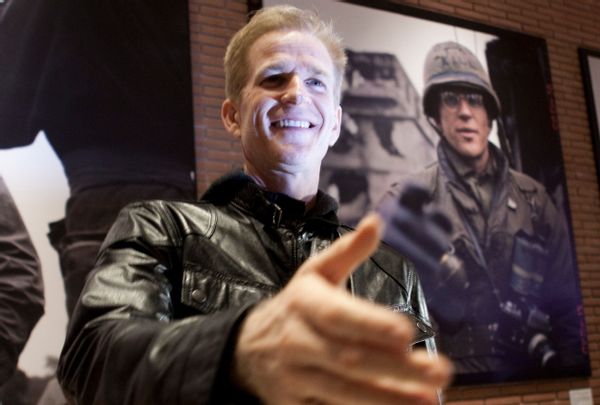 Matthew Modine opens his photography exhibition "Full Metal Jacket" diary Redux for the 25th anniversary of Stanley Kubrick's film during the 7th International Roma Film Festival (Alessandra Benedetti/Corbis via Getty Images)Even if the Vietnamese aren't painted as enemies or nameless victims needing outside help, American films found other ways to dehumanize them. Take the infamous quote “Me love you long time,” said by a Vietnamese sex worker to an American Marine in Stanley Kubrick's “Full-Metal Jacket” (1987). The interaction has at least two effects. First, it serves to sell the hypermasculinity of the Hollywood war machine, creating an image of desirable, macho patriots. However, the context of that scene and the oft-quoted line have also harmed countless women of Asian descent, depicting them as a sexual fantasy – devoid of personhood or agency — for mainly white Western male enjoyment.
Matthew Modine opens his photography exhibition "Full Metal Jacket" diary Redux for the 25th anniversary of Stanley Kubrick's film during the 7th International Roma Film Festival (Alessandra Benedetti/Corbis via Getty Images)Even if the Vietnamese aren't painted as enemies or nameless victims needing outside help, American films found other ways to dehumanize them. Take the infamous quote “Me love you long time,” said by a Vietnamese sex worker to an American Marine in Stanley Kubrick's “Full-Metal Jacket” (1987). The interaction has at least two effects. First, it serves to sell the hypermasculinity of the Hollywood war machine, creating an image of desirable, macho patriots. However, the context of that scene and the oft-quoted line have also harmed countless women of Asian descent, depicting them as a sexual fantasy – devoid of personhood or agency — for mainly white Western male enjoyment.
“It's a terrible phrase that became a racist/sexist way for people to provoke Asian/Asian-American women,” novelist Viet Thanh Nguyen, whose Pulitzer Prize-winning novel on which the “The Sympathizer” is based, denounced the phrase back in 2021 to Esquire.
“These simplified representations have come to frame Asian women as whores . . . and impact the racist desire of Asian women broadly,” adds Linh Thuy Nguyen, an associate professor at the University of Washington who specializes in Asian American and Southeast Asian American refugee studies, U.S. militarism, and race. “The quote further erases the conditions of militarized imperial violence that shaped the realities of life under war and made coerced sexual labor one of the only viable forms of economic opportunity.”
"Hollywood only sees Americans fighting with the communists."
As a byproduct of the Hollywood war machine, these portrayals of Vietnamese people, particularly Vietnamese women, erased the humanity in the countries where Americans were committing war crimes. We can also arguably see the consequence of these portrayals in the form of anti-Asian hate crimes, such as the Atlanta spa killings, today.
By valorizing the U.S. presence abroad – whether it was invading other countries or supposedly aiding them to ensure national security, combat communism or protect democracy – the U.S. would weaponize support at home through these films. This would then allow the U.S. military to minimize their role in the deaths of millions of innocent Vietnamese civilians killed during the war, as well as result in Americans directing their antagonistic views towards hundreds of thousands of Vietnamese diaspora who were displaced and had no choice but to become refugees at the mercy of the Americans’ goodwill and sponsorship.
The evolution of Vietnamese American portrayals in Hollywood
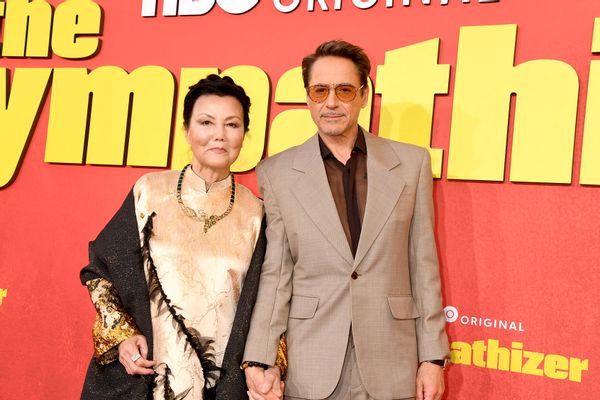 Kieu Chinh and Robert Downey Jr. attend HBO's "The Sympathizer" Red Carpet Premiere Event at Paramount Theater on April 09, 2024 in Los Angeles, California. (FilmMagic/FilmMagic for HBO/GEtty Images)Kieu Chinh has experienced the repercussions of the Hollywood war machine firsthand. Not only did she star in many of Hollywood’s Vietnam War stories as an actress, but she's also a Vietnamese refugee herself who escaped the country during the fall of Saigon in 1975. Before that, Kieu Chinh became well known and respected among Vietnamese audiences for appearing in several visiting American productions, winning best actress awards, hosting a TV talk show where she interviewed American celebrities on USO tours, and leading her own film company.
Kieu Chinh and Robert Downey Jr. attend HBO's "The Sympathizer" Red Carpet Premiere Event at Paramount Theater on April 09, 2024 in Los Angeles, California. (FilmMagic/FilmMagic for HBO/GEtty Images)Kieu Chinh has experienced the repercussions of the Hollywood war machine firsthand. Not only did she star in many of Hollywood’s Vietnam War stories as an actress, but she's also a Vietnamese refugee herself who escaped the country during the fall of Saigon in 1975. Before that, Kieu Chinh became well known and respected among Vietnamese audiences for appearing in several visiting American productions, winning best actress awards, hosting a TV talk show where she interviewed American celebrities on USO tours, and leading her own film company.
Despite her prolific resume, Kieu Chinh struggled to secure roles of meaningful Vietnamese characters with any depth. Of the few Hollywood roles that were available to her, she’d be given roles such as “Asian woman,” “Chinese woman,” or a character whose name is a clear riff off of her own such as “Kim Chinh” in “Operation C.I.A.,” where it was clear the scriptwriter barely put any thought into her character’s backstory.
“I had to accept whatever came, even the very tiny parts – one line here, one line there, one scene here, another there,” Kieu Chinh says in an interview with Vanity Fair. “I took everything. I had to work.”
"The underlying problem is that filmmakers . . . are simply not committed to representing Vietnam and Vietnamese people in a complex and realistic way."
One of the first roles she’d been offered, but eventually had to turn down, had been the Vietnamese female love interest Phuong in American director Joseph L. Mankiewicz’s 1958 Saigon film “The Quiet American” (1958) based on author Graham Greene’s anti-war novel of the same name. Despite the source material originally condemning American involvement in Vietnam, the film adaptation was one of Hollywood’s earliest propaganda films advocating for pro-American meddling in Vietnam during the First Indochina War between France and Vietnam and it left little room for Vietnamese voices to weigh in. Kieu Chinh rejected the role due to her family’s objections, which resulted in Saigon news headlines declaring, “Vietnamese unknown girl rejects Hollywood’s famous director” with her picture splashed on the front page.
Unfortunately, that role would end up being played by Italian actress Giorgia Moll as a clear example of yellowface in film. Despite her European background, Moll is supposed to portray the Vietnamese woman Phuong, wearing Vietnam’s traditional dress, the ao dai, and embracing the stereotype of the sexually submissive Asian woman. In many of her scenes with the two lead white men, she has no lines yet is seen smiling, seemingly uncomplaining, while they talk about which man she should choose as if she’s not there.
Besides playing a passive sex object, her presence also serves to represent all Vietnamese people, as the men talk about how they believe they know what’s best for her, extending a metaphor in the film about America believing they know what’s best for Vietnam. This exceptionalist view is further evident when one of the male characters speak condescendingly to a group of Vietnamese police officers in supposedly fluent Vietnamese in another scene.
“These actors generally spoke in intentionally broken English to signal that their characters were foreign, and in scenes in which they were supposed to speak Vietnamese, they mangled the pronunciation so badly that only about 5% of what they said was comprehensible,” says Nu-Anh Tran, a University of Connecticut history and Asian and Asian American studies associate professor who has specialized in South Vietnam and Vietnamese history.
Kieu Chinh would go on to star in “A Yank in Viet-Nam” opposite Marshall Thompson, and “Operation C.I.A.” opposite Burt Reynolds, playing similar roles as either a female guerrilla fighter or a female love interest, both of which ultimately served the white American male characters’ story.
After fleeing Vietnam and gaining American citizenship, Kieu Chinh started her career over and landed roles in productions such as the television series “M.A.S.H” (1977) where she played South Korean love interest Kyung Soon in an episode centered on the Korean War, and the film “The Joy Luck Club” (1993) where she played Chinese mother Suyuan Woo in the first Hollywood movie with an all-Asian cast. Again, while these iconic roles were perhaps progressive for their time, there were so few roles specifically for Vietnamese people in Hollywood that Kieu Chinh had no choice but to play other Asian ethnicities.
In addition to acting in projects, Kieu Chinh would lend her expertise on Vietnam as a cultural consultant for many Hollywood stories, including John Irvin’s 1987 film “Hamburger Hill.” Set during the controversial May 1969 Battle of Hamburger Hill assault during the Vietnam War, the film became critically acclaimed by critics for its brutal and raw depiction of the time 600 American soldiers of the American 3rd Batallion, 187th Infantry, 101st Airborne Division met North Vietnamese soldiers on a heavily fortified hill. However, the film was also criticized for never showing the faces of the North Vietnamese army and leaving out the South Vietnamese army who were attacking the same hill from the other side.
We need your help to stay independent
When reflecting on the many times she’s had to retell her refugee story for work such as “Hamburger Hill,” Kieu Chinh acknowledges it can be tiring having to talk about it and in a way, relive the trauma of it, repeatedly. “Yes, it is painful, but it is good because you have the opportunity to tell your experiences about the history,” she says. “If there's no past, then there's no future.” The actress considers herself a living witness of the Vietnam War, and as such, has a responsibility to do what she can in front of and behind the camera.
Kieu Chinh’s career and experiences resulted in a documentary based on her life called “Kieu Chinh: A Journey Home” (1996), which led her to win an Emmy Award. She’d also write a memoir called “Kieu Chinh: An Artist in Exile” detailing many of her experiences in Hollywood.
In one story, Kieu Chinh talks about the time she missed out on being cast in a minor role as Marlon Brando’s character’s unnamed wife in “Apocalypse Now." Through a series of connections with Hollywood directors she had befriended during her time as an actress in Vietnam, she met with director Coppola, who suggested she could also be a cultural consultant for his movie. Desiring more acting work again after becoming a refugee, Kieu Chinh saw the role as her way to break into Hollywood again. However, due to passport issues, she couldn’t be present in the Philippines to film the movie. Ultimately the role was cut entirely from the film.
If she had been able to be a part of “Apocalypse Now,” it likely wouldn’t have been a progressive role, considering that Vietnamese characters in the film were depicted as savage natives who worshipped Brando’s character. Coppola famously commented on his film at the 1979 Cannes Film Festival saying, “My film is not about Vietnam. It is Vietnam.” While the film doesn’t exactly valorize the Americans’ involvement in the war, its portrayal of Vietnamese people is reductive and violent in its inaccuracy and stereotyping.
“The underlying problem is that filmmakers, despite the very real differences in their politics, are simply not committed to representing Vietnam and Vietnamese people in a complex and realistic way,” Tran says.
Even when Hollywood stories don’t paint U.S. involvement in Vietnam as benevolent, it still centers Americans as the main drivers of the story, effectively erasing the multi-layered stories and experiences of the Vietnamese people who were most impacted.
“These movies still have a way of recuperating American militarism, national identity, and masculinity precisely through racialized depictions of the Vietnam War,” says Marguerite Nguyen, a Wesleyan University associate professor and author of “America's Vietnam: The Longue Durée of U.S. Literature and Empire.”
The ultimate danger of these cinematic depictions is the historical revisionism of the Vietnam War, told primarily from the Americans’ side.
“The Sympathizer” addresses Hollywood’s Vietnam War stories
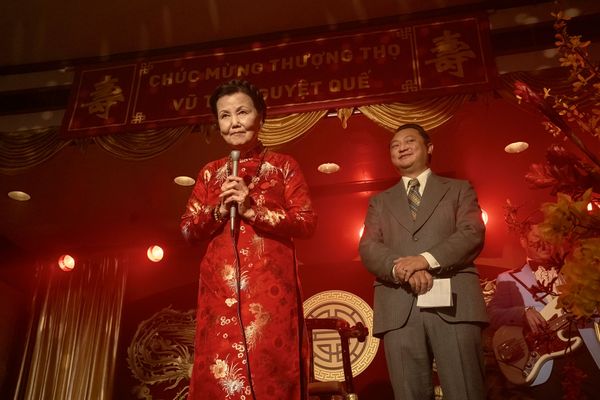 Kieu Chinh and Phanxinê in "The Sympathizer" (Hopper Stone/HBO)It would be 67 years from Kieu Chinh’s first credited role before she’d get to star in “The Sympathizer,” one of the few Hollywood-produced projects centered on the Vietnamese perspective about the Vietnam War, adapted from a novel by a Vietnamese refugee. She's proud of her involvement in the show, playing the mother of the Major. “This is a breakthrough for Hollywood,” Kieu Chinh says.
Kieu Chinh and Phanxinê in "The Sympathizer" (Hopper Stone/HBO)It would be 67 years from Kieu Chinh’s first credited role before she’d get to star in “The Sympathizer,” one of the few Hollywood-produced projects centered on the Vietnamese perspective about the Vietnam War, adapted from a novel by a Vietnamese refugee. She's proud of her involvement in the show, playing the mother of the Major. “This is a breakthrough for Hollywood,” Kieu Chinh says.
In one episode, Kieu Chinh appears in a scene that is meant to satirize Hollywood’s depictions of the Vietnam War. The series protagonist Captain (Hoa Xuande) lands a cultural consultant role for a Vietnam War movie called “The Hamlet” by American film director Nicos Damianos (Robert Downey Jr.), a role inspired by Hollywood auteurs and more specifically, the experiences of Coppola making "Apocalypse Now." In Damianos’ film, the Vietnamese characters are nameless background characters with little to no lines, and they die on screen and end up with nameless prop tombstones. Sound similar to a certain sampan massacre scene?
"I packed few belongings. I had my little handbag with my passport, my lipstick and a few dollars left to my name."
Captain points out the inaccuracy of the way “The Hamlet” depicts Vietnamese villages and tries to fight for the Vietnamese characters to have some significant lines. In a particularly comedic scene meant to poke fun at Hollywood’s treatment of Vietnamese actors, “The Hamlet” filming is disrupted when Damianos realizes one of the Vietnamese extras is speaking her dialogue in Cantonese in response to American soldiers (John Cho, David Duchovny) raiding her village. When requested to speak in Vietnamese, the extra can’t because she is in fact Chinese. Captain brings in Kieu Chinh’s character to play the Vietnamese extra instead. But instead of translating the line Damianos wrote, “Don’t shoot me. I’m a peasant. I’m only a peasant,” Captain has Kieu Chinh's character sneak in the line, “We’re not afraid. Our hands will close around the throat of American imperialism!” in Vietnamese, with Damianos and the American crew none the wiser.
Viet Thanh Nguyen wrote the Hollywood arc in the story as a deliberate nod to Vietnam War films like “Apocalypse Now," although he doesn't believe directors like Coppola deliberately decided to erase Vietnamese voices. “I think the power of racism is such that [Coppolla] didn’t have to do it on purpose,” Nguyen says in a 2019 interview with PBS. “The assumption could simply be that Vietnamese people had no speaking role whatsoever in this American imagination. Americans don’t think of that as racist, but it is racist.”
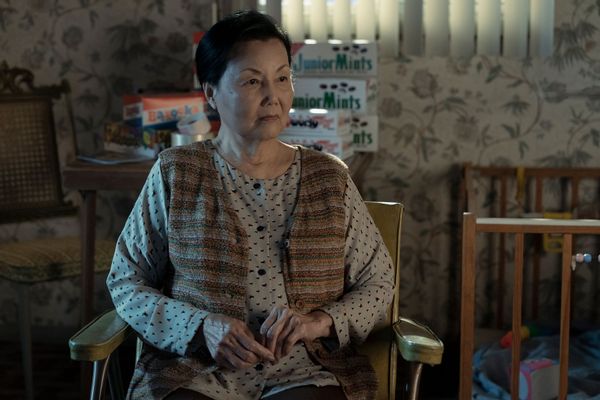 Kieu Chinh in "The Sympathizer" (Hopper Stone/HBO)Kieu Chinh also doesn’t particularly blame any of the Hollywood directors, writers and actors she worked with for depicting Vietnamese people in such dehumanizing ways. “We want to hope that they do the right thing,” Kieu Chinh says. “We want to hope that they educate the right history.”
Kieu Chinh in "The Sympathizer" (Hopper Stone/HBO)Kieu Chinh also doesn’t particularly blame any of the Hollywood directors, writers and actors she worked with for depicting Vietnamese people in such dehumanizing ways. “We want to hope that they do the right thing,” Kieu Chinh says. “We want to hope that they educate the right history.”
“The Sympathizer” not only calls out Hollywood’s lack of interest in depicting the Vietnamese experience, it also subverts Americans’ stereotypical narratives of the Vietnamese people and the Vietnam War by centering the narrative on the refugees that escaped during the fall of Saigon and how they acclimate to a new life in America. The arc of Kieu Chinh’s character, the Major’s mother, over the course of the show, spotlights this subversion particularly well. In a heartbreaking scene early in the series, her character gets chosen over her son’s daughter to board one of the last planes out of Vietnam, mirroring many of the real-life stories of Vietnamese refugees who had to make difficult last-minute decisions about which of their family members they had to leave behind.
Kieu Chinh empathizes with her character’s plight deeply, having also experienced separation from her father and brother at a young age following the end of World War II and the split of Vietnam into two regimes after the Geneva Conference. She would later be separated again from her adopted family and her friends during the fall of Saigon in 1975, when she hopped on a plane in a mad dash to Singapore.
“Much like the scene in 'The Sympathizer,' I packed few belongings,” Kieu Chinh says. “I had my little handbag with my passport, my lipstick and a few dollars left to my name. And the military attacked the Tan Son Nhat international airport and there was so much chaos. Air Vietnam couldn’t take off. No other flight could take off. I hid in the VIP room at the airport and we waited until the next day. Via a connection with a friend, I was able to board a Pan American airline taking American personnel only.”
Similar to Kieu Chinh’s reality, the show would further show her character struggling to assimilate to the new cultural norms of America, all the while balancing her relationship with her son and the other characters in the show who all have their own dilemmas and traumas to endure. In a refreshing flipping of the Hollywood war machine script, “The Sympathizer” depicts Vietnamese and Vietnamese Americans in all of their complexity and multidimensionality as agents of their own story, capable of both great good and great evil.
Want a daily wrap-up of all the news and commentary Salon has to offer? Subscribe to our morning newsletter, Crash Course.
Not unlike many Vietnamese American refugees who Americans may have helped to come to America, Kieu Chinh feels lucky to have gotten consistent work throughout her career. “As an actress, I always respect the writer, the script and the director,” Kieu Chinh says. “I try to take the direction from the director to fulfill my duty as an actor. And off set, of course, I talk about the script with the director, but how much they take up my advice is up to them.”
After the success of “The Sympathizer,” some Vietnamese American viewers have expressed a desire for even more diverse and nuanced portrayals of the Vietnamese diaspora like the show. Kieu Chinh plans to keep working and hopes that Hollywood will produce more stories with more characters for Vietnamese actors that allow for a full breadth of experience to be shown on screen.
“Next year is already the 50-year anniversary of the end of the Vietnam War,” she says. “But there are still so many stories that have not been told. So I hope that after 'The Sympathizer,' Hollywood will continue to pick up more stories about our lives, not only ones about war. Vietnam is more than just a war.”
Read more
about this topic


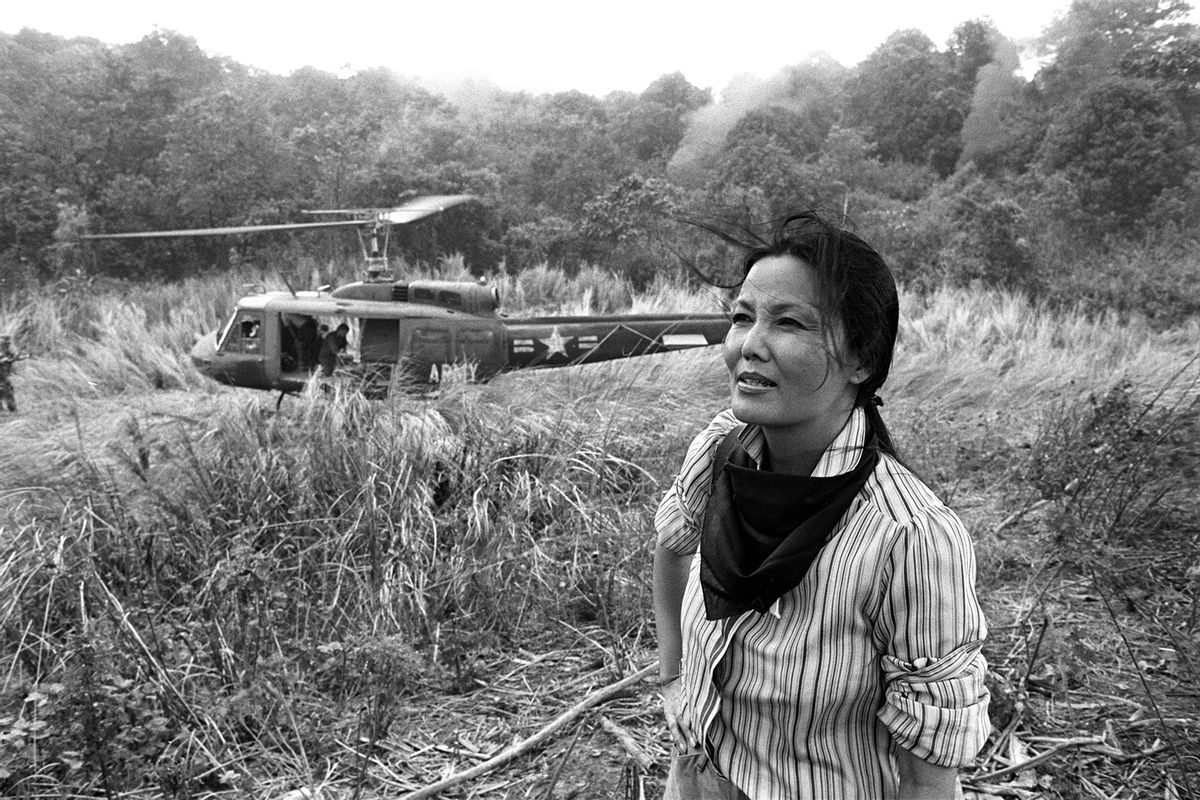
Shares